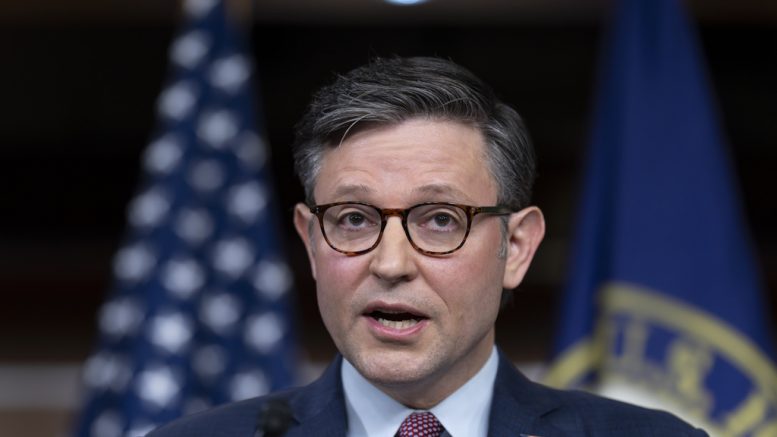WASHINGTON (AP) — The last time Congress tried to fund the government to prevent a federal shutdown, it cost House Speaker Kevin McCarthy his job.
This time, new Speaker Mike Johnson, R-La., appears on track for a better outcome Tuesday as the House prepares to vote on a stopgap package to keep the government running into the new year. If approved, the Senate would act next, ahead of Friday’s shutdown deadline.
The new Republican leader faces the same political problem that led to McCarthy’s ouster, and is unlikely to win enough support from his Republican majority to pass the bill on its own. Instead, Johnson will be forced to rely on Democrats to ensure passage to keep the federal government running.
Johnson has called it a “necessary bill” that he hoped would put House Republicans “in the best position to fight” for their conservative priorities in the new year.
Under his proposal, Johnson is putting forward a unique — critics say bizarre — two-part process that temporarily funds some federal agencies to Jan. 19 and others to Feb. 2. It’s a continuing resolution, or CR, that comes without any of the deep cuts conservatives are demanding. It also fails to include President Joe Biden’s request for nearly $106 billion for Ukraine, Israel, border security and other supplemental funds.
“I think it’s a very big mistake,” said Rep. Chip Roy, R-Texas, a member of the hard-right Freedom Caucus.
Roy said there’s “a whole lot of opposition” among House Republicans to partnering with Democrats to pass the bill.
The Democratic leader Hakeem Jeffries said his party is “carefully evaluating” the proposal from the Republican leadership before giving approval.
“We remain concerned,” he said about the two-part approach. Veteran lawmakers on both sides of the aisle have called it cumbersome, unusual and unworkable.
But Jeffries in a letter to Democratic colleagues noted that the GOP package met the Democratic demands to keep funding at current levels without steep reductions or divisive Republican policy priorities.
“We have articulated that we will not accept any extreme right-wing policy provisions in connection with funding the government,” Jeffries wrote.
With the House narrowly divided, Johnson cannot afford many defections from Republicans, which is forcing him into the arms of Democrats.
Winning bipartisan approval of a continuing resolution is the same move that led McCarthy’s hard-right flank to oust him in October, days after the Sept. 30 vote to avert a federal shutdown. For now, Johnson appears to be benefiting from a political honeymoon in one of his first big tests on the job.
“Look, we’re going to trust the speaker’s move here,” said Rep. Drew Ferguson, R-Ga.
The Senate, where Democrats have a slim majority, has also signaled its willingness to accept Johnson’s package ahead of Friday’s deadline to fund the government.
Senate Republican leader Mitch McConnell said the House GOP package “will keep the lights on,” and he will support it.
But McConnell, R-Ky., noted that Congress still has work to do toward Biden’s request to provide U.S. military aid for Ukraine, Israel and other needs. Senators are trying to devise a separate package to fund U.S. supplies for the overseas wars and bolster border security, but it remains a work in progress.
If approved, passage of another continuing resolution would be a stunning capstone to the House GOP’s first year in the majority. The Republicans have worked tirelessly to cut federal government spending only to find their own GOP colleagues are unwilling to go along with the most conservative priorities. Two of the Republican bills collapsed last week as moderates revolted.
Instead, the Republicans are left funding the government essentially on autopilot at the levels that were set in bipartisan fashion at the end of 2022, when Democrats had control of Congress but two parties came together to agree on budget terms.
All that could change in the new year when 1% cuts across the board to all departments would be triggered if Congress fails to agree to new budget terms and pass the traditional appropriation bills to fund the government by springtime.
The 1% automatic cuts, which would take hold in April, are despised by all sides — Republicans say they are not enough, Democrats say they are too steep and many lawmakers prefer to boost defense funds. But they are part of the debt deal McCarthy and Biden struck earlier this year. The idea was to push Congress to do better.

































